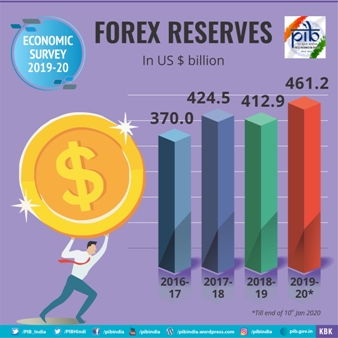In the multifaceted world of international finance, central banks and governments play a pivotal role in managing their foreign exchange reserves. Forex reserves, comprising a nation’s holdings of foreign currencies, gold, and other assets, serve as a key instrument in maintaining economic stability and fostering global trade. Understanding the intricacies of forex reserve management is crucial for deciphering the complexities of global financial markets.

Image: www.indiatimes.com
Navigating the labyrinth of forex reserve management, we encounter a kaleidoscope of functions. It’s a dynamic process that encompasses deploying foreign exchange instruments, intervening in currency markets, and formulating strategies to combat external shocks. By judiciously managing their forex reserves, countries can mitigate exchange rate volatility, safeguard against economic downturns, and promote sustainable economic growth.
Delving into Forex Reserve Management
Defining Forex Reserves
Forex reserves, the linchpin of a nation’s financial stability, are the stockpiles of foreign currencies, gold, and other financial instruments held by its central bank. These reserves serve as a crucial buffer against external economic shocks and provide governments with the flexibility to intervene in currency markets.
The Genesis of Forex Reserves
The origins of forex reserves can be traced back to the Bretton Woods system established in 1944. This system pegged currencies to the US dollar, which was itself pegged to gold. As a result, countries accumulated vast reserves of gold and US dollars to maintain the fixed exchange rate system.

Image: pib.gov.in
Purposes of Forex Reserves
- Maintaining Exchange Rate Stability: Forex reserves provide central banks with the firepower to intervene in currency markets, dampening excessive fluctuations and preventing sharp depreciations that could destabilize the economy.
- Safeguarding Against External Shocks: Forex reserves serve as a safety net during economic crises, allowing countries to meet their external obligations and cushion the impact of adverse events on their economies.
- Facilitating International Trade: Forex reserves enable countries to settle their trade transactions with other nations, facilitating the seamless flow of goods and services across borders.
Exploring the Techniques of Forex Reserve Management
Currency Diversification
To mitigate risks associated with fluctuations in a single currency, central banks often diversify their forex reserves by investing in a basket of different currencies. This strategy reduces exposure to currency-specific shocks and enhances the stability of overall reserves.
Gold Reserves
Gold, a traditional safe-haven asset, has long been a cornerstone of forex reserves. Central banks allocate a portion of their reserves to gold as a hedge against geopolitical uncertainties and financial market volatility.
Reserve Management Strategies
- Active Management: Central banks proactively adjust their forex reserve composition based on market conditions and economic outlooks, aiming to maximize returns and minimize risks.
- Passive Management: This approach involves holding a relatively fixed proportion of different reserve assets, providing stability and minimizing transaction costs.
Contemporary Trends in Forex Reserve Management
The Rise of Non-Reserve Assets
In recent years, some countries have expanded their forex reserve portfolios to include non-reserve assets such as equities, bonds, and real estate. This diversification strategy seeks to enhance returns and hedge against inflation.
Currency Wars and Geopolitics
Geopolitical tensions and trade disputes have influenced forex reserve management strategies. Countries have been accused of manipulating their currencies to gain competitive advantages, leading to accusations of currency wars.
Tools for Success: Tips and Expert Advice
Enhancing Forex Reserve Management
To effectively manage forex reserves, policymakers should consider:
- Macroeconomic Fundamentals: A sound understanding of a country’s economic fundamentals, including inflation, growth prospects, and external vulnerabilities, is crucial for making informed reserve management decisions.
- Investment Horizon: Defining a clear investment horizon and risk tolerance helps central banks align their reserve management strategies with their long-term objectives.
- Risk Management: Employing robust risk management frameworks is essential to safeguard forex reserves against potential losses and market volatility.
Frequently Asked Questions
Q: What is the optimal level of forex reserves?
A: The optimal level varies depending on a country’s economic circumstances, trade patterns, and risk appetite. There is no one-size-fits-all answer.
Q: How do countries acquire forex reserves?
A: Forex reserves are primarily acquired through trade surpluses, foreign direct investment, and capital inflows. Central banks can also intervene in currency markets to accumulate or deplete reserves.
What Is Forex Reserve Management
https://youtube.com/watch?v=0ZRTMjKhgFU
Conclusion
Forex reserve management is a complex and multifaceted undertaking that requires a thorough understanding of global economic dynamics and financial markets. By skillfully managing their forex reserves, countries can bolster their economic resilience, facilitate international trade, and weather external economic storms.
As the global economy continues to evolve, forex reserve management strategies will need to adapt to new challenges and opportunities. Countries that embrace innovation and adopt sound management practices will be well-positioned to navigate the complexities of the global financial system.






